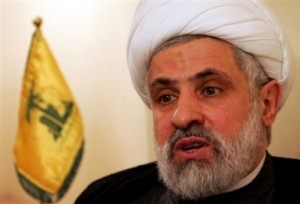 Lebanon’s Hezbollah is denying US allegations of involvement in a $300 million laundering scheme and drugs trafficking, with its deputy leader claiming in comments published Tuesday the charges were false and that America was “not fooling anyone” with accusations meant to harm his anti-Israeli group.
Lebanon’s Hezbollah is denying US allegations of involvement in a $300 million laundering scheme and drugs trafficking, with its deputy leader claiming in comments published Tuesday the charges were false and that America was “not fooling anyone” with accusations meant to harm his anti-Israeli group.
Sheikh Naim Kassem said the Iran-backed Shiite Muslim group does not follow “a religiously prohibited path” to develop its resources and that the accusations were part of U.S. efforts to tarnish Hezbollah’s image.
His remarks to supporters Monday evening followed accusations by U.S. federal authorities last week that Lebanese financial institutions wired more than $300 million to the United States in a laundering scheme they said used the U.S. financial system to benefit Hezbollah.
“America’s allegations of money laundering or financing the group from narcotics money are not fooling anyone,” Kassem said.
The remarks, published on Hezbollah’s website Tuesday, were the group’s first on the issue.
The U.S. government said in the lawsuit filed in a Manhattan federal court that it seeks nearly a half-billion dollars in money-laundering penalties from some Lebanese financial entities, 30 U.S. car buyers and a U.S. shipping company.
Prosecutors said the $300 million was wired from Lebanon to the United States and used to buy used cars and ship them to West Africa. They said Hezbollah money-laundering channels were used to ship proceeds from the car sales and narcotics trafficking back to Lebanon.
The U.S. accusations came after an indictment in federal court in Virginia accused fugitive Ayman Joumaa of leading a drug conspiracy that provided income for Hezbollah, which has been designated by the U.S. State Department as a terrorist organization since 1997.
A Washington-based Drug Enforcement Administration spokesman, Lawrence R. Payne, told The Associated Press in February that Joumaa’s organization laundered money using 50 used car lots in the United States. Cars were exported to Lebanon and West Africa.
U.S. Attorney Preet Bharara said the civil case brought Thursday reveals a massive international scheme in which Lebanese financial institutions, including banks and two exchange houses linked to Hezbollah, passed money through the U.S. financial system to launder narcotics trafficking and other criminal proceeds through West Africa and back into Lebanon.
The government said substantial portions of the cash were paid to Hezbollah.
WP

Leave a Reply
You must be logged in to post a comment.